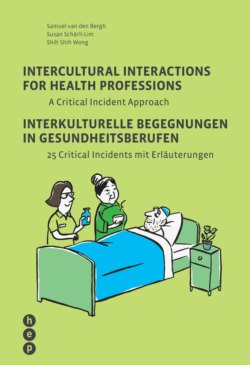Читать книгу Intercultural Interactions for Health Professions / Interkulturelle Begegnungen in Gesundheitsberufen (E-Book) - Samuel van den Bergh - Страница 14
На сайте Литреса книга снята с продажи.
CRITICAL INCIDENT 8: The Mamma-Mia-Syndrome
ОглавлениеThe clock strikes midnight and Petra Wagner, a junior nurse, is on night shift duty. As she passes the room of Mr Massimo Marino, she can hear the 37-year-old Italian patient groaning in pain after his appendicectomy. Petra smiles and tells herself that she will not be tricked again this time. She recalls what her senior nurse told her about the Italians exaggerating their pain. For Italians, life is a drama, and they love it. Thinking that Mr Marino is indulging in misery to attract her attention, she goes over to his bed with a smile and tells him, «It’s going to be o. k., Mr Marino. You have just taken the pain killer, give it time to take effect.» However, Mr Marino keeps groaning. Petra pats his shoulder and leaves the room. The nurse on the morning shift discovers that Mr Marino has a high fever and his wound is inflamed. Petra is ashamed of her reaction and misinterpretation.
How should Petra react?
Please select the alternative(s) which could be an appropriate reaction
1.Petra apologises to Mr Marino. She tells him that her senior nurse mentioned that Italians were always exaggerating pain.
2.Petra admits to her colleague on the morning shift that she misinterpreted the groaning of Mr Marino as a typical Italian exaggeration. She then apologises to Mr Marino.
3.Petra explains to the nurse on the morning shift that she asked Mr Marino if he was doing fine, but he did not say anything.
4.Petra takes time to reflect on this negative experience. In the future, she wants to include the family when taking a patient history to determine whether the particular patient’s behaviour deviates from his or her culture.
Analysis
1.This is not a likely alternative. Blaming others is not professional. Please choose again.
2.This is a good solution. Petra is acting professionally by admitting her misinterpretation. Petra has stereotyped Mr Marino as just another loud, attention-seeking Italian who likes to exaggerate his pain. He was groaning because of his inflamed wound and not because he is an Italian. Petra has learned an important lesson on the danger of stereotyping.
In addition, it is important for Petra to remember that there are always differences between individuals and it is wise to take each case individually. She could have followed up on Mr Marino later to make sure that his pain had been addressed. In addition, it would be helpful if Mr Marino informed the nurse of his pain verbally instead of just groaning and assuming the nurse would take appropriate action.
3.This is not a good solution. It is true that Mr Marino did not tell Petra that he is suffering from severe pain. Yet it is Petra’s duty to examine Mr Marino and assess the cause of his groaning. As explained in answer No. 2, it is dangerous and inaccurate to think people belonging to the same geographical group are all alike. Health professionals should be sensitive to patients’ needs as well as their cultural differences. Please make another choice.
4.Reflection is an important step after an unfortunate occurrence. Factors such as one’s inherited personality, the length of time spent in a country, the age at which they arrive, their desire to assimilate, level of education etc. cause individuals to deviate from the norm of their culture.
Galanti (2004) recommends that health professionals should find out information from the family if the particular patient is a typical representative of his or her culture or not.
